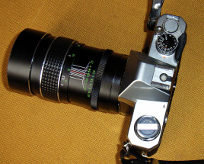

A global archive of independent reviews of everything happening from the beginning of the millennium
To return to Comment 2012 click here
For publication dates click here
Read our Copyright Notice click here
5 December 2012
From today's pre-budget statement by the Chancellor of the Exchequer: In addition to the third of a billion pounds announced this autumn for British science, we are today announcing £600 million more for the UK’s scientific research infrastructure.
27 December 2012
The Daily Telegraph reports:
The University of Cambridge has been awarded more than £12 million for research into graphene flexible electronics and opto-electronics, which could include things like touch-screens and other display devices.
_________________________
 M42
photography:
M42
photography:
 Exiting Casino Square 1993
Exiting Casino Square 1993
 Early morning shot of my old bedroom window in the
former Saxon capital, Exning, on Ektachrome
Early morning shot of my old bedroom window in the
former Saxon capital, Exning, on Ektachrome
OLEDs
Reviewed by ANDRE BEAUMONT
28 November 2012
kenrockwell.com has for some time been my favourite photography review site. It is a site that proves that individual enterprise can succeed on the internet. Ken Rockwell's irreverent view of giant businesses, his earlier campaign regarding California's tax laws and his entertainingly direct views about socialism all add to the attractions of a site that has lots to say about technology, too.
A week ago I went to a talk given by Professor Sir Richard Friend, who over 20 years ago in Cambridge patented with others the first light emitting diode, the predecessor of the organic light emitting diode (OLED) and other carbon-based molecular materials that behave in similar ways to silicon-based semiconductors.
Such fundamental scientific exploration continues in relatively small university laboratory groups and should not be shackled by the constraints of needing to be linked to commercial applications before time.
Elsewhere in Cambridge, dozens, probably hundreds, of graduates and students are writing apps for use on mobile devices. Most are not making money but it is from their cohort of micro enterprises, or from using the experience that they have gained, that a future world leading company is likely to emerge, much like Arm Plc did in the past.
Meanwhile, companies like Sony, about whom Mr. Rockwell has recently written, or Samsung who the speaker mentioned, have spent decades working on the technology necessary to make OLEDs viable in consumer products like mobile telephones.
The point is that science and technology are not the same and should not be always lumped in the same boat politically.
Sony and Samsung have had a lot of market clout in their home territories, and to a fair extent internationally, and the patience and determination to continually invest in technology over long timeframes.
There are some large companies in Britain that have shown the same determination in respect of technology - Rolls Royce, Johnson Matthey and others - but they are quite few and the medium sized ones do not yet have the market clout.
If specialization is the issue, then Britain is more specialized towards invention - the fundamental science and the exploratory start-ups.
This is why there is a case for an unlevel playing field in taxation - always favouring the small, even the individual.
The recent news that both Panasonic and Sony, long technologically superlative, are now losing money, shows that no society can rely for ever on the large players to deliver the goods.
Britain can still back its fundamental science and exploratory innovators at relatively little cost. The unit size they operate at is small so any given sum of money can back very many groups.
The challenge is then to find ways to make what is invented in Britain tarry awhile whilst technology is developed to exploit it. This we are not too good at and the structures of finance must carry some of the blame for this. Private institutions have been too short termist, government backed ones too bureaucratic.
------------------------------------------------------------------------------------------------
Postscript 2 December 2012
It would, of course, be good to see OLEDs eventually on the back of digital cameras as an alternative to LCDs. Then one could review photographs in a better range of colours in-camera even if OLED monitors are too expensive to be consumer products for now.
The current work in Cambridge, both scientific and technological, in this area concentrates quite a bit on plastic screens (by definition carbon-based). These could lead to the production of flexible mobile phones, less likely to be damaged if dropped. Doubtless the technology could also be used in cameras. A few are already designed so that they can be dropped a few feet with impugnity but the main gain might be in reduced weight.
Cameras can be used as an illustration of why an interventionist government industrial policy could be fraught with complications.
If you direct government investment to an area where the country is already a player, e.g. automobiles, you advantage some participants at the expense of others - the government investment in rescuing British Leyland disadvantaged Vauxhall, Ford and other car manufacturers in Britain at the time.
So ideally you choose an area which is high tech but in which the country has no industrial participation. Britain, like most countries, is not involved in the manufacture of consumer cameras. It has expertise in optics, electronics and marketing but can these really be channeled by government will into creating a technologically competitive company like Panasonic, Samsung or Sony? The government's ill-fated attempt in the seventies to create a competitor to Intel suggests not and the EU's competition regime makes it even more improbable now.
So you are left to direct the government marshalled money into small niches. The problem then becomes that the niches are so small that they are not going to make any impact on employment or GDP worth recording.
For sure, micro niches can be worth filling. A few years ago a few hundred examples of a film camera called the Bessaflex were manufactured in Japan. It was a manual SLR camera with a bright viewfinder which made use of the multitude of M42 screw thread lenses manufactured in the seventies and eighties. About a tenth of the cost of Nikon lenses of similar vintage, and generally not as good, but produced by a wide range of manufacturers, they are increasingly orphaned optics, built using solid metal, waiting for a new life, and costing a fraction of modern metal bodied lenses. One supposes the manufacturer of Bessaflex made at least some money from the short production run. It is time someone made a digital camera with an M42 screw thread. Of course, one could use one that takes an adapter but it is not the same thing. It is a niche worth filling but only a niche.
Naturally this is a bit of a diversion from the discussion and the real question - in an open market economy, determined to eschew protectionism, can one really have a strongly interventionist industrial policy except on paper?
Can a nation have a mega niche that helps drive the economy? Arguably and a little oversimplified, in the 15 years to 1995 Britain had North Sea oil (as Norway has now) and in the 15 years after financial sevices. Governments protected these niches, which were also generously generative of tax revenues, and the whole economy was pulled along sufficiently by them.